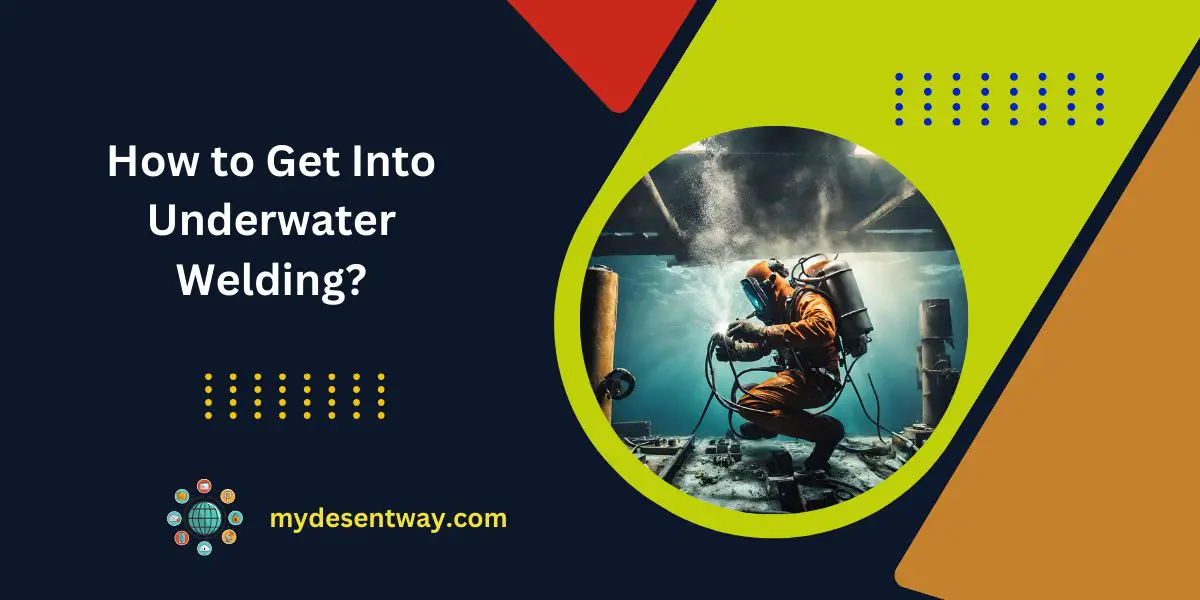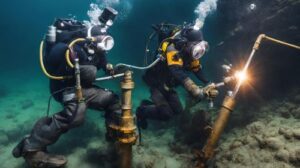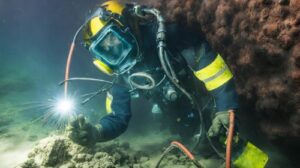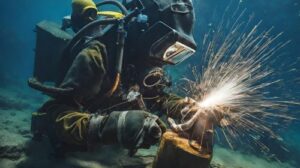Table of Contents
Are you intrigued by the mysteries beneath the ocean? Do you enjoy working with your hands and crave adventure? If yes, then a career in underwater welding might be for you! But before you take the plunge, know that it requires more than just a love for the sea.
In this comprehensive guide, we’ll delve into the depths of how to get into underwater welding, covering everything from the necessary skills and qualifications to the job prospects and potential challenges. So, strap on your oxygen tank, and let’s dive right in!
Learn About the Industry of Underwater Welding
Before we plunge headfirst into the specifics of how to get into underwater welding, let’s first gain a clear understanding of what this industry entails.
What is Underwater Welding?
Underwater welding is a specialized form of welding that takes place underwater, typically in environments such as oceans, lakes, or even swimming pools! It involves joining metal structures or repairing pipelines and vessels beneath the surface of the water, using various welding techniques.
The Importance of Underwater Welding
Underwater welding plays a crucial role in various industries, including marine construction, offshore oil and gas, shipbuilding, and underwater infrastructure maintenance. Without skilled underwater welders, many underwater structures would deteriorate or remain unfinished, posing significant risks to both human life and the environment.
How to Get Into Underwater Welding
Now that we grasp what underwater welding is all about let’s delve into how you can kickstart your journey into this exciting profession!
Step 1: Obtain the Necessary Education and Training
Just like any other skilled trade, becoming an underwater welder requires adequate education and training. Here’s how you can get started:
- High School Diploma or Equivalent: Start by obtaining a high school diploma or GED equivalent. Focus on subjects such as mathematics, physics, and chemistry, as they provide a solid foundation for understanding welding principles.
- Attend a Welding School: Enroll in a reputable welding school or technical institute offering specialized underwater welding training. Look for programs that are accredited by organizations such as the American Welding Society (AWS) or the Diver Certification Board of Canada (DCBC).
- Gain Diving Certification: In addition to welding skills, you’ll also need to become a certified commercial diver. This involves completing a diving training program and obtaining certifications from organizations such as the Association of Diving Contractors International (ADCI) or the Diver Certification Board of Canada (DCBC).
Step 2: Hone Your Welding Skills
Underwater welding requires a high level of proficiency in both welding techniques and diving operations. Here are some ways you can hone your skills:
- Practice Welding Techniques: Spend ample time practicing various welding techniques in dry and underwater conditions. Familiarize yourself with welding equipment and safety procedures.
- Gain Diving Experience: Get as much diving experience as possible, both recreationally and professionally. Familiarize yourself with underwater environments and develop strong diving skills, including buoyancy control and underwater navigation.
Step 3: Obtain Relevant Certifications and Licenses
To work as an underwater welder, you’ll need to obtain certain certifications and licenses to ensure your competency and safety on the job. These may include:
- Commercial Diver Certification: Obtain certification from recognized diving agencies such as the ADCI or DCBC.
- Underwater Welding Certification: Pursue specialized underwater welding certifications from organizations like the AWS or the International Marine Contractors Association (IMCA).
- Welding Procedure Qualification: Some employers may require additional certifications for specific welding procedures or materials.
Step 4: Gain Practical Experience
Once you’ve completed your education and obtained the necessary certifications, it’s time to gain practical experience in the field. Consider options such as:
- Apprenticeships: Seek out apprenticeship opportunities with experienced underwater welding professionals or diving contractors. This hands-on experience is invaluable for honing your skills and building your reputation in the industry.
- Entry-Level Positions: Start with entry-level positions in related fields, such as commercial diving or welding, to gain practical experience and network with industry professionals.
Step 5: Stay Updated and Network
The underwater welding industry is constantly evolving, with new technologies and techniques emerging regularly. Stay updated on industry trends and advancements by attending workshops, conferences, and continuing education programs. Networking with fellow professionals can also open doors to new opportunities and career advancement.
FAQs About Getting Into Underwater Welding
What are the job prospects for underwater welders?
Job prospects for underwater welders can vary depending on factors such as location, industry demand, and individual experience and qualifications.
Industries such as offshore oil and gas, marine construction, and underwater infrastructure maintenance typically offer opportunities for skilled underwater welders.
How do I obtain the necessary training for underwater welding?
Training for underwater welding can be obtained through technical schools, community colleges, or specialized diving schools that offer programs specifically for underwater welding.
Is there a demand for underwater welders in the job market?
Yes, there is a demand for underwater welders in the job market, particularly in industries such as offshore oil and gas, marine construction, shipbuilding and repair, underwater engineering, and marine salvage.



